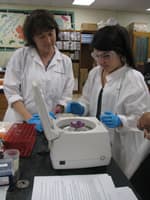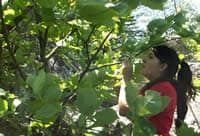
Jennifer Weller, an associate professor of bioinformatics and genomics in the College of Computing and Informatics (CCI), is helping Charlotte-Mecklenburg Schools (CMS)students to fight chestnut blight, an Asian fungus that has killed off billions of American chestnut trees since 1904.
Weller is working with Olympic High School science teachers Jeanne Smith and Erica Putnam through the school’s B-3 Summer Program, which focuses on biotechnology, biodiversity and bioinformatics at Olympic’s School of Biotechnology, Health and Public Administration.
The American chestnut was once a dominant forest tree throughout the East Coast, according to the American Chestnut Foundation. Chestnuts were a major food source for wildlife and families living within the tree’s range. Wagons of nuts were sold at Christmas in cities like New York and Philadelphia. First discovered in New York City in 1904, the chestnut blight spread quickly. By 1950, approximately four billion trees had been destroyed by the fungus.
“We’re trying to find genes from the Chinese chestnut in order to help the American chestnut resist the blight fungus,” explained Ashley Westbrook, a rising senior at Olympic. “Here, I’m doing something to help the world. It’s about saving trees.”
 Each Friday, the class travels to different forests throughout North Carolina, including Crowder’s Mountain where they collect leaf samples and gain field-biology experience. Monday through Thursday, students are in the school’s lab extracting DNA, producing copies and separating fragments. This diagnostic work helps students get one step closer to finding a solution.
Each Friday, the class travels to different forests throughout North Carolina, including Crowder’s Mountain where they collect leaf samples and gain field-biology experience. Monday through Thursday, students are in the school’s lab extracting DNA, producing copies and separating fragments. This diagnostic work helps students get one step closer to finding a solution.
Weller stated, “This project allows students to combine modern techniques with actual breeding. They are merging perspectives.”
Jayden Walsh interned with Weller during the 2012-13 school year. A rising senior at Olympic, he said he learned more details about trial and error and how the B-3 program could get better results for the American chestnut.
“B-3 introduced me to skills more sophisticated in the DNA purification process,” said Jayden. “This is a chance you’re not going to get anywhere else. When I really think about it, I’m dumbfounded at the thought of possibly saving an endangered tree,” said Walsh.
During the 2013-14 academic year, Weller will host some of Olympic’s B-3 students in her research lab to provide them with more hands-on experience, as well as the opportunity to work with more advanced molecular biology equipment.
A version of this story was published originally on the Charlotte-Mecklenburg Schools website.